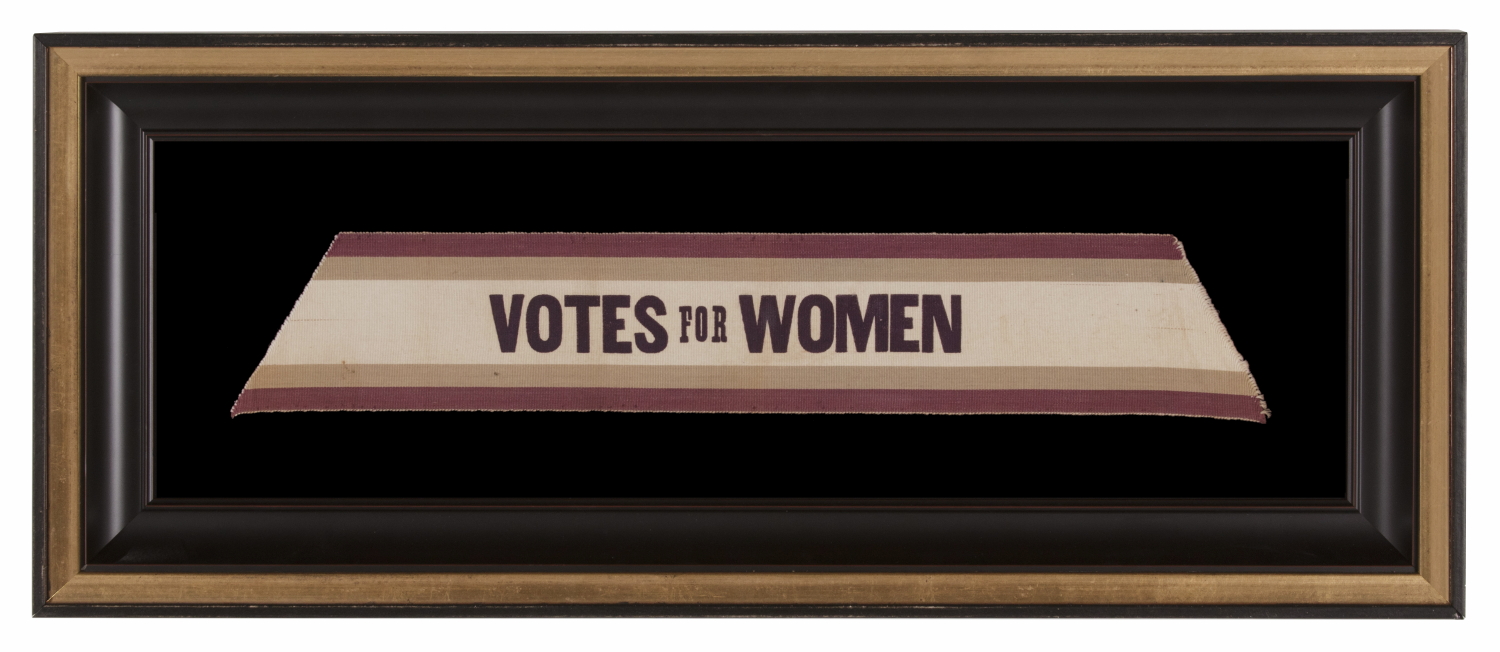
| |
SILK SUFFRAGETTE SASH RIBBON IN VIOLET & GREEN WITH "VOTES FOR WOMEN" TEXT, MADE FOR THE WOMEN'S POLITICAL UNION IN NEW YORK CITY, 1910-1915 |
|
| Available: |
Sold |
| Frame Size (H x L): |
23.25" x 4.25" |
| Flag Size (H x L): |
31.75" x 13" |
|
| Description....: |
|
Section of wide silk ribbon, of the type generally worn as a sash, with green and purple striping and printed black text that reads "Votes for Women." Made for use by the Women's Political Union (WPU) in New York City, the ribbon could be bought in length and employed for whatever use the purchaser desired. Sometimes it was undoubtedly affixed around hats and worn as armbands.
The Women's Political Union was the brainchild of American suffragette leader Harriot Eaton Stanton Blatch (1856-1940). Blatch was the daughter abolitionist Henry B. Stanton and suffrage pioneer Elizabeth Cady Stanton, who served as the first president of the National American Woman Suffrage Association (NAWS) and co-wrote the landmark, four-volume, "History of Woman Suffrage" with Susan B. Anthony, Matilda Joslyn Gage, and Ida Husted Harper. Following graduation from Vassar College, Harriot assisted these women by compiling research for the book. She then moved to England for 20 years, marrying a British businessman. In 1902 she returned to the States and became involved with two significant suffrage groups, the Women’s Trade Union League and the National American Woman Suffrage Association. In 1907, disgruntled with their ineffectiveness and stagnation, she founded the Equality League of Self-Supporting Women, which appealed to the working class. Before this time the suffrage organizations in America were largely represented by socialites, whose numbers could not effectively influence the vote. In 1910 the Equality League changed its name to the Women's Political Union (WPU) and organized America's first large-scale suffrage parade, which took place on Fifth Avenue in New York.
To advertise the activities of the WPU, Harriot borrowed some of the imagery used by her British suffragette peers, along with the violet and green colors. American suffrage items were generally yellow and white, but Blatch wanted to distinguish her organization from the others that were active at the time.
In 1915 the WPU merged with suffragette leader Alice Paul's Congressional Union, which later morphed into the National Woman’s Party.
On November 2nd of 191, New York State male voters defeated a referendum that would have amended the U.S. Constitution to give all women of the state the right to vote. New York was among four eastern states where the issue came to a vote, including New Jersey, Pennsylvania and Massachusetts, all of which were unsuccessful. Public support had been favorable in New York specifically, where the Suffrage movement was 100,000 members strong. Polls had predicted the likeliness of a win, and while it did not occur that year, a successful follow-up campaign in 1917 made New York the first eastern state to adopt suffrage.
Mounting: The textile was has been hand-stitched to 100% cotton twill, black in color, that was washed to reduce excess dye. An acid-free agent was added to the wash to further set the dye and the fabric was heat-treated for the same purpose. The mount was then placed in a modern frame with a finish that is very dark brown, nearly black, with red with a red undertone and highlights, to which a black-painted and hand-gilded Italian molding was added as a cap. The glazing is U.V. protective acrylic.
Condition: There is minor foxing and soiling, accompanied by minor fading of the violet and significant fading of the green bars. |
|
|
|
| Collector Level: |
Intermediate-Level Collectors and Special Gifts |
|
| Flag Type: |
|
|
| Star Count: |
|
|
| Earliest Date of Origin: |
1910 |
|
| Latest Date of Origin: |
1915 |
|
| State/Affiliation: |
New York |
|
| War Association: |
|
|
| Price: |
SOLD |
|
| |
Views: 2568 |
|
|
|

